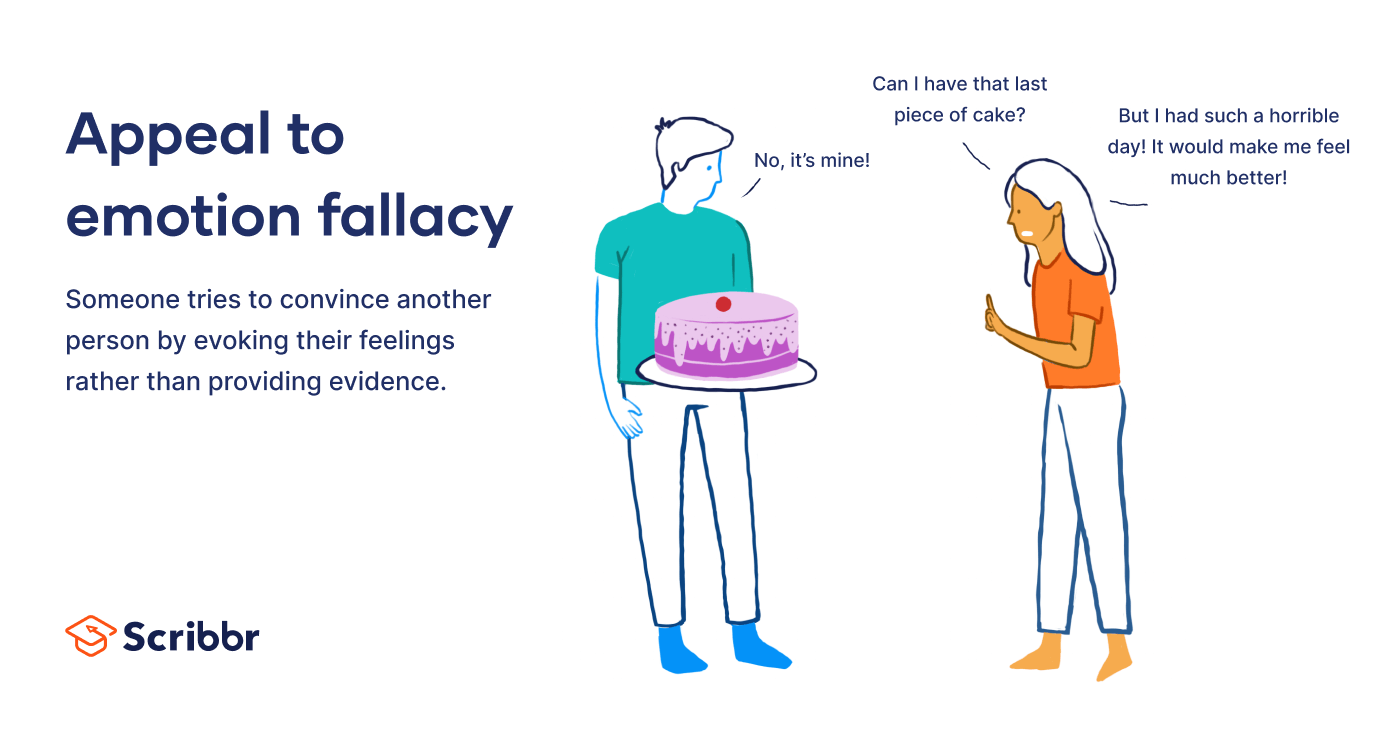Appeal to Emotion Fallacy | Definition & Examples
Appeal to emotion fallacy occurs when someone tries to convince another person by evoking their feelings rather than providing evidence.
With the appeal to emotion fallacy, people accept a claim as true because they react emotionally to it. As a result, they focus on factors irrelevant to the question at hand, ignoring facts and logical reasoning.
“Can I have the last piece of cake? You know how much I love it, and it’s been a tough day for me. I’ve had such a bad day, and this cake would just make me feel so much better. You don’t want me to be sad, right?”
Appeal to emotion fallacy (also known as argument from passion, argumentum ad passiones, or argument from emotion) is common in various contexts like advertising, law, and politics.
What is appeal to emotion fallacy?
Appeal to emotion fallacy occurs when someone tries to win an argument by evoking emotion, without using facts or logic. Arguments that appeal to our emotions often attempt to influence our viewpoints in a manipulative way. However, feelings like anger, frustration, or sympathy are not always relevant to establishing the truth of a claim.
Appeal to emotion is an informal fallacy because the problem lies in the content of the argument. In the absence of logical reasoning, someone may appeal to our emotions to conceal the fact that there is no compelling evidence to support their claim. However, arguments that use emotions instead of reason are flawed.
According to the appeal to emotion fallacy, any feeling, whether positive or negative, can be manipulated to persuade an audience. Even positive emotions can lead to negative consequences, such as poor decisions.
The appeal to emotion fallacy is sometimes named after the particular feeling evoked, such as an appeal to pity, an appeal to fear, or an appeal to flattery.
Are emotional appeals always fallacious?
An appeal to emotion or “pathos,” together with “logos” (logic) and “ethos” (character), is one of the the three main rhetorical strategies used to persuade readers or listeners. Calls to action (like donate, vote, or buy) often rely on emotional appeals.
However, it’s important to keep in mind that not all emotional appeals are fallacious. Emotions can be a valid part of an argument, especially when discussing subjective matters or personal experiences. In specific contexts like sports coaching, emotional appeals are necessary to inspire and motivate athletes. What makes an appeal to emotion fallacious in an argument is the substitution of evidence with emotions.
Why do emotional appeals work?
Emotional appeals are an effective persuasive technique because they can bypass our critical thinking and target any emotion (including fear, hate, love, and compassion). When someone successfully evokes a positive or negative feeling in us, they cause us to neglect reason and to ignore the actual evidence.
Because emotional appeals can create a strong personal connection between the speaker and the audience, they are often memorable. When we feel emotionally connected to a message, we are more likely to pay attention and engage with it. As a result, emotionally charged messages are very likely to influence our decisions.
An emotional appeal is sometimes combined with incomplete facts or information that is taken out of context in an attempt to make the argument appear logical. However, this is superficial. Propagandists, for example, employ this tactic to stir up hatred or fear against minorities. Because it’s hard to argue against emotions, such appeals are often effective, even if they lack factual evidence.
What are different ways to appeal to emotions?
There are different ways to create an emotional hook as a speaker or writer:
- Using metaphors and analogies can simplify complex ideas and make them emotionally accessible to an audience. They can make a message more relatable by using familiar or vivid comparisons (e.g., comparing a country to a ship lost at sea in the context of a political speech).
- Storytelling can be a powerful way to convey an experience and engage with an audience. However, stories like personal anecdotes can be exaggerated or entirely fabricated to manipulate people’s emotions.
- Using emotionally charged words and phrases, such as “think of the children,” “this will destroy our way of life,” or “if you care about X, then you must do Y” can influence others’ opinions by eliciting emotions like fear.
- Resorting to other logical fallacies like the ad hominem fallacy (i.e., attacking an opponent instead of their argument) or the red herring fallacy (i.e., trying to arouse feelings and distract others from the facts of an argument) are often used to evoke an emotional response.
Appeal to emotion fallacy examples
Appeal to emotion fallacy is often used in daily life in the absence of concrete logical evidence.
In this example, the driver is appealing to the officer’s compassion. They are trying to evoke the officer’s pity in an attempt to avoid the consequences of their action (the ticket). The emotional appeal attempts to deflect the focus from the actual offense (speeding) to the driver’s personal circumstances, which are irrelevant to the violation.
Most political speeches aim at evoking emotions to get people to act or vote a certain way. However, when emotions are used to justify a claim, the appeal to emotion is fallacious.
“My fellow citizens! If we allow our opponents to win, everything we hold dear in this country will go to ruin. Their policies will destroy the very fabric of our society. Can you imagine the chaos and suffering that will ensue if they gain power? If you care about our country and our way of life, you must support me in the upcoming election!”
Here, the candidate exploits both negative and positive emotions: they try to evoke both fear of the opposition and love for one’s country, without presenting any factual evidence for their claims. The speech relies on emotional manipulation to portray the opposition as a threat, hoping to garner support without engaging in an in-depth discussion of the policies or issues at hand.
Other interesting articles
If you want to know more about fallacies, research bias, or AI tools, make sure to check out some of our other articles with explanations and examples.
AI tools
Fallacies
Frequently asked questions
Sources for this article
We strongly encourage students to use sources in their work. You can cite our article (APA Style) or take a deep dive into the articles below.
This Scribbr articleNikolopoulou, K. (2023, November 13). Appeal to Emotion Fallacy | Definition & Examples. Scribbr. Retrieved 2 July 2025, from https://www.scribbr.co.uk/fallacy/appeal-to-emotion-fallacy/
Wrisley, G. (2018). Appeal to Emotion. Bad Arguments: 100 of the Most Important Fallacies in Western Philosophy, 102–105. https://doi.org/10.1002/9781119165811.ch14




